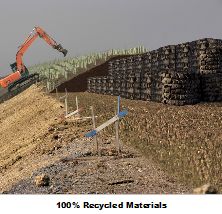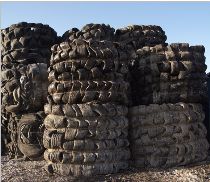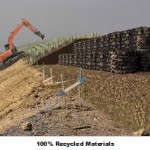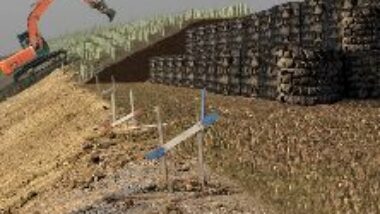Every now and again, an idea comes along that seems so obvious that you wonder why nobody thought of it before, and the BSI PAS 108: Specification for production of tyre bales for use in construction is one of those.

It will be obvious to most people that the disposal of vehicle tyres is a real headache for the waste management industry, and as motorists, we are all feeling the pinch from the rapidly rising tyre disposal cost every time we buy a new tyre for our vehicles.
Certainly, the last time I bought a new tyre, the garage added several pounds to my bill for disposing of the old one.
However, landfill operators have been using tyres for leachate drainage within landfills for some years as an engineering material and were able to see that using tyres as drainage layers in landfills provides adequate flow capabilities at close to zero cost. However, manhandling individual tyres to stack them efficiently on site is a tedious dirty and time-consuming task and has probably limited tyre use uptake
That was, as far as we are aware, just about the only use available for whole tyres.
However, now that WRAP has commissioned the British Standards Institution (BSI) which has prepared the Publicly Available Specification, PAS 108, in collaboration with the tyres reprocessing industry, a whole new range of uses has opened up.
The secret is that designers and purchasers can now use the structural and drainage characteristics researched by these bodies and incorporate them into designs just like any other proprietary geosynthetic material.
In short, providing a specification for producing compact tyre bales of consistent and verifiable quality and dimension opens up a new and large market.
The compression of these tyres into bales provides a means of reusing these tyres whilst at the same time, reducing the demand for primary aggregate materials in construction.
PAS 108 provides a specification that suppliers can adopt for producing tyre bales such that potential customers will be assured that they are procuring a construction material of consistent and verifiable quality.
Furthermore, the core of this document addresses the production, handling, storage, transport and placement of standardized tyre bales, the dimensions and properties of which are standardised and described in this PAS.
However, the big gain lies in the guidance given on engineering properties and typical construction applications.
If you haven't already heard of it, WRAP is a non-profit organization that the UK government founded in 2000. It is backed by government funding from England, Scotland, Wales, and Northern Ireland, which is, in my view, very well used in a project like this.
However, the question remains as to who is making PAS 108 Tyre Bales and where you can get hold of them for your project. One such supplier is Rubber Remade Limited which is producing them now.
Rubber Remade Limited endeavours to seek sustainable uses for these waste materials.

Because the tyre bales are all uniform, they can be readily stacked and placed to build structures of pre-compressed material that are similar to a stone-filled gabion.
They are, however, a fraction of the cost of a gabion structure!
Not so good-looking as rock, of course, but with some ingenuity, it should be possible in many applications to cover or disguise the tyre bales beneath suitable planting.
As a result, we think that these bales will prove to be incredibly versatile, easy to use, and practical, for all sorts of applications in civil engineering (road building, river, and coastal defences), as well as rapidly erected walls and wonderfully effective sound attenuation screening.
We have summarised a selection of suggested uses below:
| Sound/acoustic dampeners | Ditch filling for transport crossing |
| Retaining walls | Thermal insulation material |
| Under-road strengtheners | Crash/impact Barriers |
| Soil/landscape elevation | River/Canal control |
| They can be used instead of concrete blocks (but are cheaper and easier to transport) | Rifle RangesGabions |
| Quick construction purposes | Flood defence/Artificial Levee Production |
| Offshore coastal defence | Onshore coastal defence |
| Erosion/mudslide control | Shock absorbers |
| Landfill Purposes(Creating Cells/Foundations, etc.) | Area buffers (protection for personnel against camp/site traffic) |
| Revetment Development | Embankment Repair |
Tyre bales produce neither short-term leachate nor other emissions; they are extremely slowly biodegradable, but the Environment Agency is said to have put on record that tyres do not decompose!
These tyre blocks will last for many, many years, and even once deployed for one task, they can easily be re-deployed years later to another completely different role.
Tyre bales have already been used at the River Witham Flood Defence Scheme, and bulk bale stacking has both replaced shingle at the Pevensey Beach Flood Defence Scheme and provided a much more robust defence than just shingle if storm damage ever erodes the top away!
Tyres and the EU Landfill Directive
The Landfill Directive declared that only whole tyres could be used for landfill engineering, meaning that shredded tyres were effectively outlawed, but following approaches from a number of its members, NISP alerted Defra, which in turn approached the EC for clarification. The response was that the Landfill Directive is concerned with the disposal of waste, not recovery, meaning that recovery activities fall outside the ban and shredded tyres could be used.
Peter Laybourn, NISP director, explained (CIWM Journal, March 2006) that 25 percent of the UK's waste tyres were used as landfill leachate drainage layers and added: “Strict implementation of the regulations would have removed this major disposal avenue and raised the problem of having to find an alternative home for more than 10 million used tyres each year.”
NISP Report on the Use of Tyres in Landfill
The report concluded:
“ that used tyre-derived aggregate replacement (UTDAR) provided a more sustainable alternative to virgin aggregates as a leachate drainage blanket in landfill as well as offering substantial operator cost savings. The European Commission has now confirmed that the use of shredded tyres in landfill when considered on a case-by-case basis can be classed as recovery.
NISP provides an Acrobat file on this subject. [File no longer available.]
Alternative Tyre Disposal Methods
The other main disposal method for tyres is incineration. Tyres have a high calorific value and incinerate well, particularly if shredded, when they can be used in combination with other materials as fuel.
Other pages you will probably find useful are:
Tyre Recycling: Tyres Can No longer be Sent to landfill
This well researched article should clarify a great deal about frugal tyre use and tyre recycling. By Ken McEvoy (written in 2005) Under European Law it is no longer possible to dump car tyres into landfill sites which means we have to find a solution to the problem of what to do with old tyres […]





